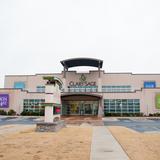- Rogers State University is a regional four-year university in northeastern Oklahoma recognized for its high-quality academic programs, nurturing scholastic atmosphere, distance learning options, and high-technology learning environment.
School Highlights
Rogers State University serves 3,917 students (59% of students are full-time).
The college's student:teacher ratio of 11:1 is lower than the state community college average of 18:1.
Minority enrollment is 48% of the student body (majority American), which is less than the state average of 56%.
Quick Stats (2025)
- Enrollment: 3,917 students
- In-state tuition: $5,725
- Out-state tuition: $12,766
- Acceptance Rate: 77%
- Student:teacher ratio: 11:1
- Minority enrollment: 48%
- Source: Integrated Postsecondary Education Data System (IPEDS)
Top Rankings
Rogers State University ranks among the top 20% of public schools in Oklahoma for:
Category
Attribute
School Resources
Community Size
School Overview
The teacher population of 342 teachers has stayed relatively flat over five years.
Rogers State University
(OK) Community College Avg.
Carnegie Classification
Baccalaureate Colleges: Diverse Fields
Baccalaureate/Associate's Colleges: Mixed Baccalaureate/Associate's
Institution Level
Four or more years
At least 2 but less than 4 years
Institution Control
Public
Public
Total Faculty
342 staff
154 staff
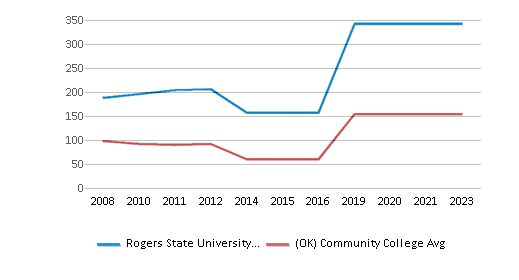
School Calendar
Student Body
The student population of Rogers State University has grown by 9% over five years.
The student:teacher ratio of 11:1 has increased from 10:1 over five years.
The Rogers State University diversity score of 0.67 is less than the state average of 0.76. The school's diversity has stayed relatively flat over five years.
Total Enrollment
3,917 students
1,473 students
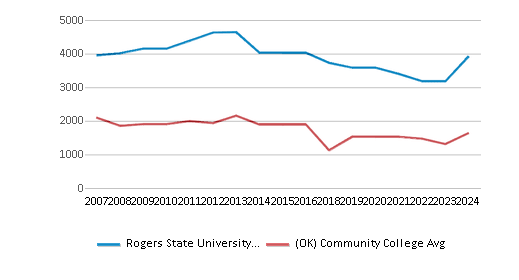
Student : Teacher Ratio
11:1
18:1
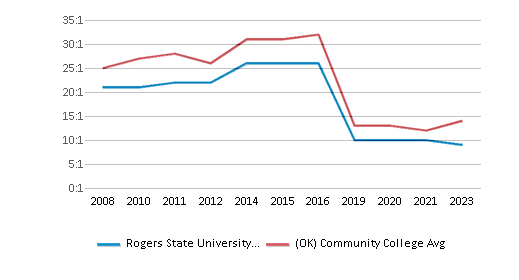
# Full-Time Students
2,314 students
663 students
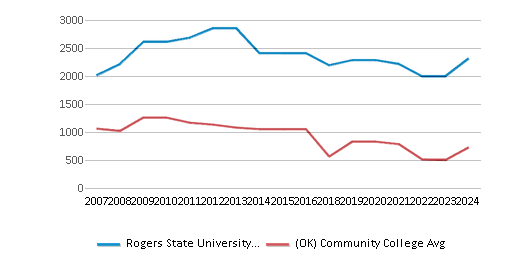
# Part-Time Students
1,603 students
1,058 students
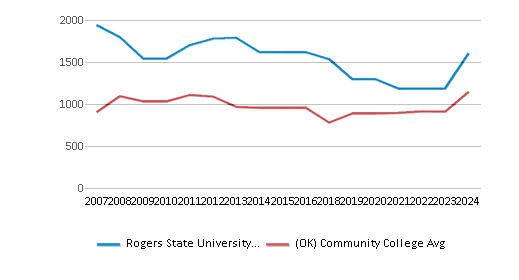
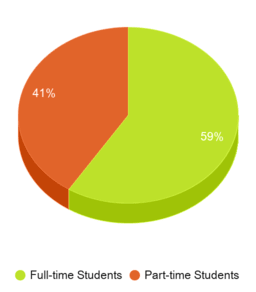
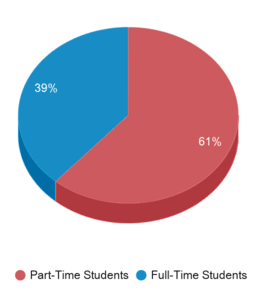
# Enrollment Undergraduate
377 students
236 students
# Full-Time Undergraduate Students
2,222 students
610 students
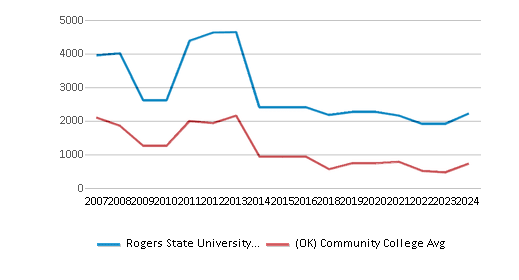
# Full-Time Graduate Students
92 students
5 students
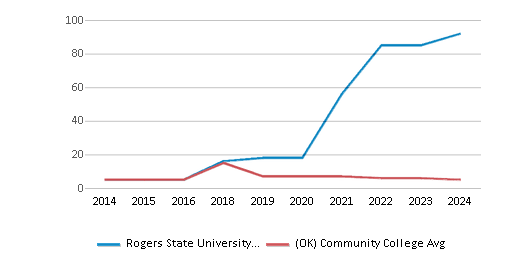
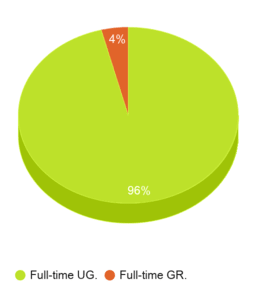
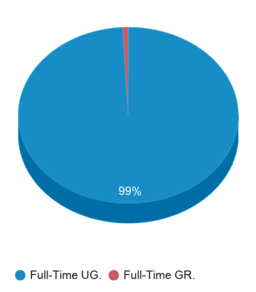
# Part-Time Undergraduate Students
1,553 students
972 students
# Part-Time Graduate Students
50 students
14 students
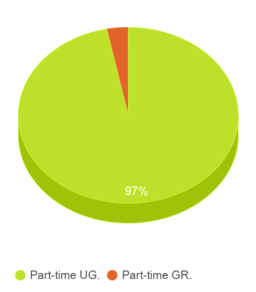
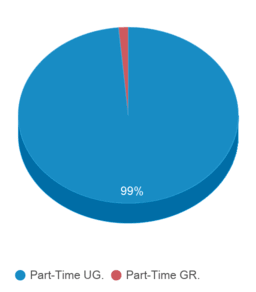
Total Dormitory Capacity
830 students
300 students
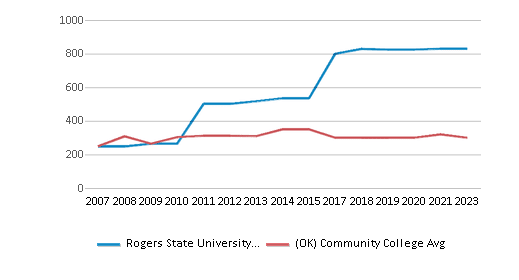
% American Indian/Alaskan
19%
8%
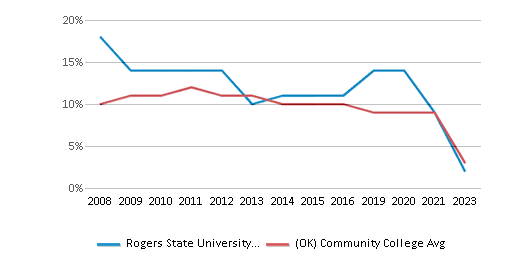
% Asian
2%
4%
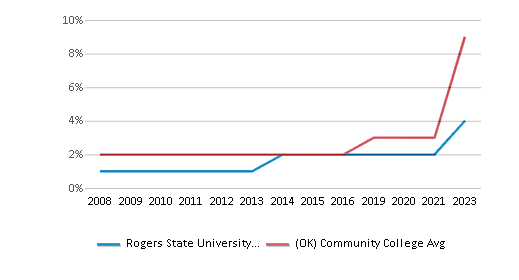
% Hispanic
8%
11%
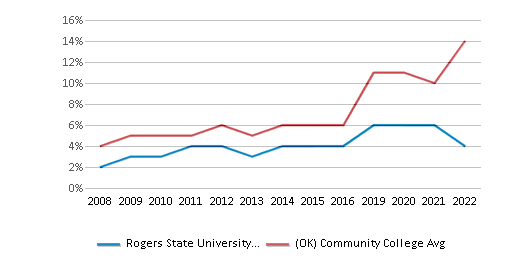
% Black
4%
10%
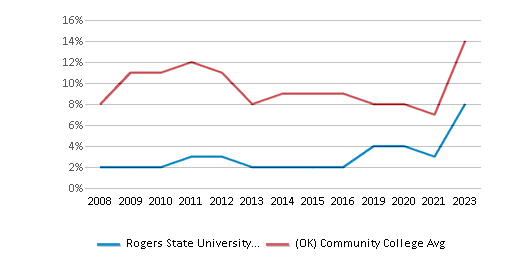
% White
52%
44%
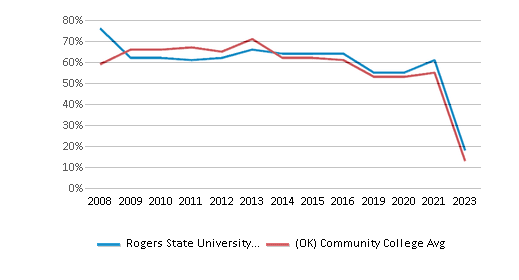
% Hawaiian
n/a
8%
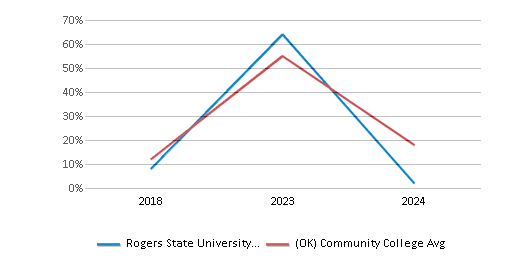
% Two or more races
12%
10%
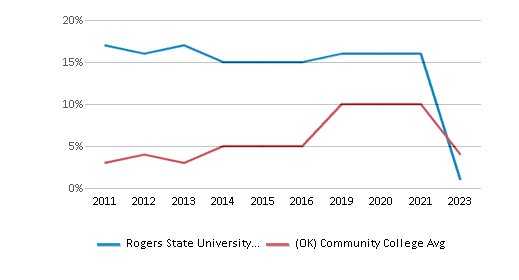
% Non Resident races
3%
1%
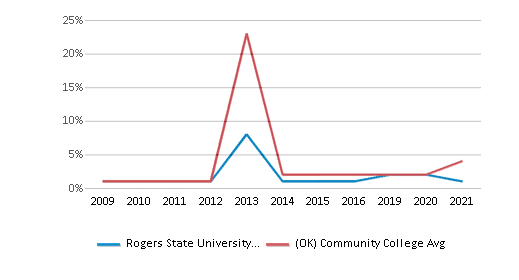
% Unknown races
2%
4%
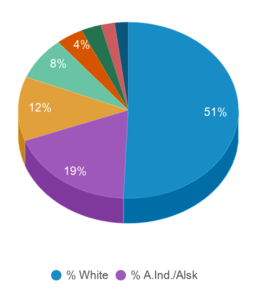
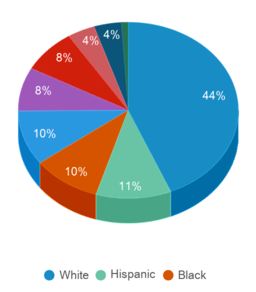
Diversity Score
0.67
0.76
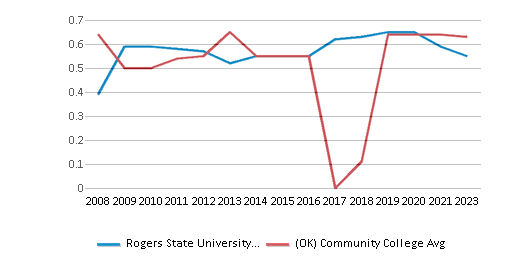
College Completion Rate (Students who graduate in less than 4 years)
n/a
0.5629%
College Completion Rate (Students who graduate in 4 years or more than 4 years)
0.2508%
0.1525%
Average Graduate Earnings (10 Years)
$35,300
$34,700
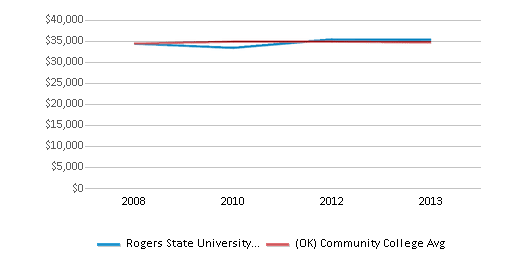
Tuition and Acceptance Rate
The public in-state tuition of $5,725 is more than the state average of $3,475. The in-state tuition has declined by 23% over four years.
The public out-state tuition of $12,766 is more than the state average of $7,963. The out-state tuition has declined by 19% over four years.
In-State Tuition Fees
$5,725
$3,475
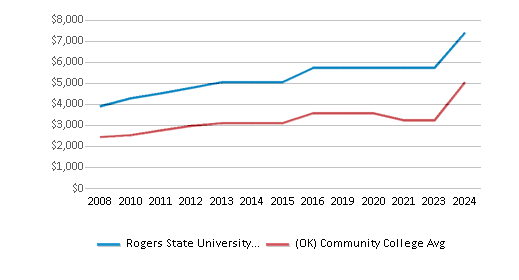
Out-State Tuition Fees
$12,766
$7,963
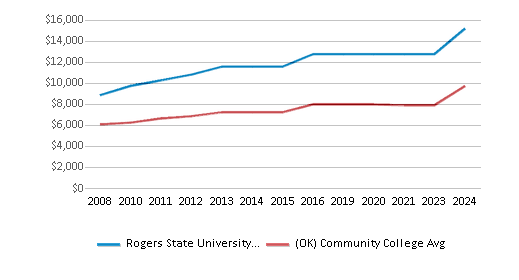
% Students Receiving Some Financial Aid
95%
88%
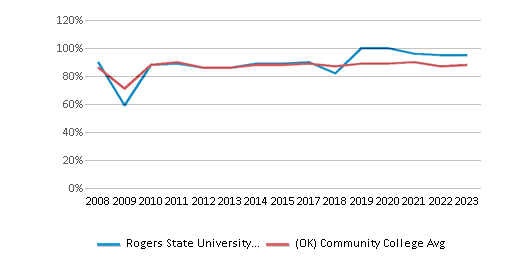
Median Debt for Graduates
$20,500
$12,000
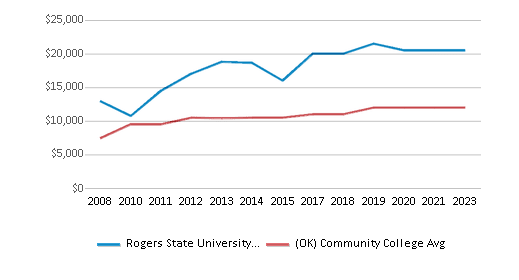
Median Debt for Dropouts
$7,753
$5,889
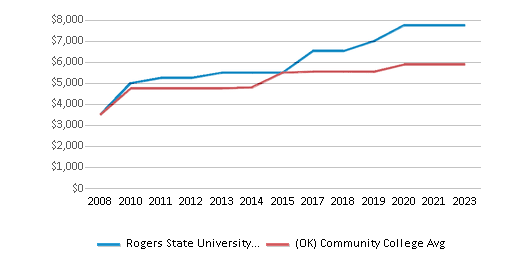
Acceptance Rate
77%
55%
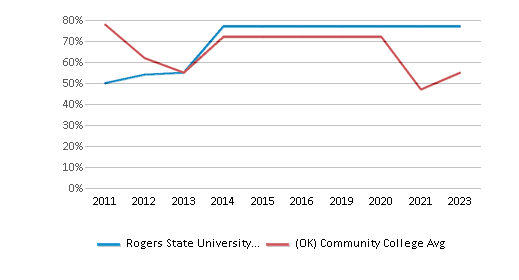
SAT Reading
n/a
387
SAT Math
n/a
475
ACT Total Avg.
59
53
ACT Composite
20
18
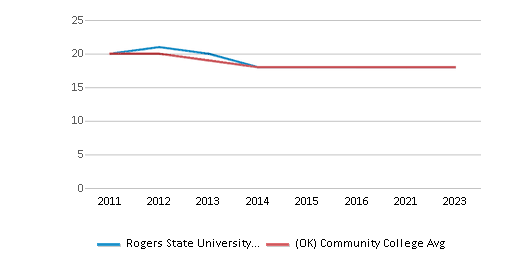
ACT English
20
17
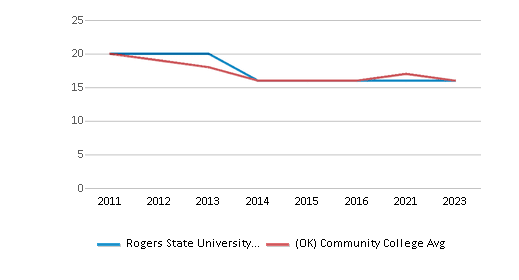
ACT Math
19
18
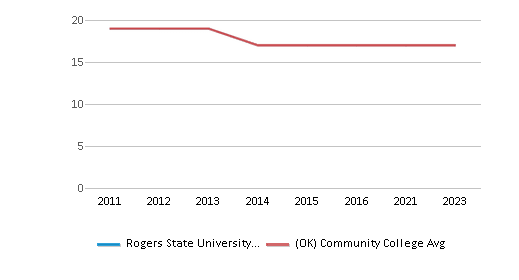
Source: 2024 (or latest year available) Integrated Postsecondary Education Data System (IPEDS) , School Administrators
School Notes
- RSU was founded in 1909 – just two years after Oklahoma was granted statehood. The university was officially established as Eastern University Preparatory School in Claremore by the Oklahoma Legislature in its second session. The mission of the Eastern University Preparatory School was to prepare the sons and daughters of Native Americans, farmers, and ranchers for entry into the colleges and universities of Oklahoma. Rogers State University is recognized for its quality academic programs, distance learning options, and high-technology learning environment with campuses in Claremore, Bartlesville, and Pryor. RSU is a national pioneer and leader in distance education. RSU was the first university in Oklahoma to offer bachelor's and associate's degrees entirely via the Internet. RSU offers a variety of bachelor's and associate's degrees to assist our students in achieving their personal and professional goals. RSU offers Bachelor's Degrees in Applied Technology, Biology (Options in Environmental Conservation and Medical and Molecular), Business Administration (Options in Accounting, Entrepreneurship, Human Resources, and Management), Business Information Technology (Options in Computer Network Administration and Software Development and Multimedia), Communications (Options in Corporate Communications and Radio and Television), Justice Administration (Option in Law Enforcement), Liberal Arts, and Social Science (Options in History and Political Science and Psychology and Sociology). RSU also offers a wide variety of Associate's Degrees including Art, Business, Education, and Nursing. Rogers State University is accredited by the Higher Learning Commission of the North Central Association of Colleges and Schools (NCA). RSU is a member of the North Central Association of Colleges and Schools.
Frequently Asked Questions
How much does Rogers State University cost?
Rogers State University's tuition is approximately $5,725 for In-State students and $12,766 for Out-State students.
What is the acceptance rate of Rogers State University?
The acceptance rate of Rogers State University is 77%, which is higher than the state average of 55%.
What is Rogers State University's ranking?
Rogers State University ranks among the top 20% of community college in Oklahoma for: Percent of students receiving financial aid and Largest student body.
Recent Articles

Obtaining Your Bachelor's Degree at a Community College
Explore the evolving landscape of community colleges offering bachelor's degrees, addressing affordability, accessibility, and workforce needs.

A to Z of Community College Certificates and Courses
From business and healthcare to technology and skilled trades, the article showcases the breadth of options available to students seeking to enhance their knowledge, develop new skills, or pursue career advancement.

What is a Community College?
This comprehensive guide explains what a community college is, its history, and its role in higher education. It covers the types of programs offered, differences from four-year colleges, benefits of attending, and important considerations for prospective students, providing valuable insights for those exploring educational options.





